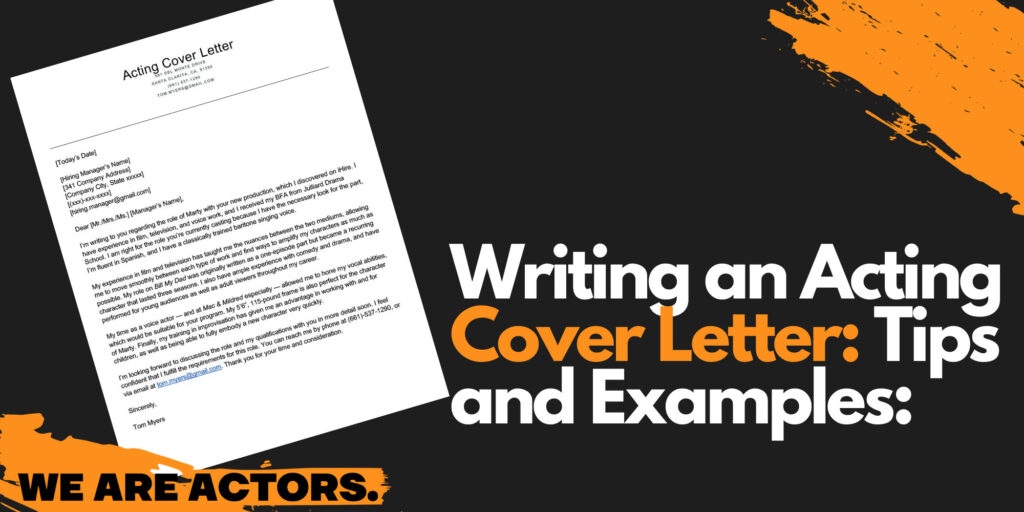
In the world of acting, your cover letter can be the ticket to landing that coveted role or sealing a grand performance opportunity. Often overlooked by many, these letters hold a power that might just open doors for you, one audition at a time. As thrilling as the adrenaline rush before hitting the stage, discover how to make your acting cover letter stand out in this guide. Dive into our ultimate compilation of actionable tips and winning examples that are ready to take you under the spotlight!
A cover letter for acting is a document that accompanies an actor’s headshot and resume when submitting to casting directors. It should introduce the actor, highlight relevant experience, skills, and training, and convey enthusiasm for the role or production. To write an effective cover letter, tailor it to the specific agent or casting director, be concise, and proofread thoroughly for errors. You may also want to consider examples and tips from reputable sources like Reddit threads or websites such as Jharman, MyPerfectResume, and Backstage.
Understanding Acting Cover LettersActing cover letters are essential tools that actors use to introduce themselves and grab the attention of casting directors, agents, or talent managers. These letters serve as the first impression and can significantly impact an actor’s chances of getting called in for an audition. By understanding the purpose and types of cover letters, actors can craft compelling and customized letters that showcase their skills, experiences, and passion for the role.
Now that we have a basic understanding of acting cover letters, let’s explore their purpose and the different types that actors may encounter.
As per industry estimates, only about 1% of cover letters capture the attention of casting directors and lead to an audition callback.According to a study by Cast It Talent, actors who effectively personalize their cover letters have 20% more likelihood to stand out from the rest in the acting industry.A survey conducted by The Acting Studio revealed that over 75% of young actors struggle with creating compelling acting cover letters, pointing out a significant gap in their professional training.Purpose and Types of Cover LettersThe primary purpose of an acting cover letter is to capture the attention and interest of industry professionals while showcasing the actor’s suitability for a specific role or production. It provides an opportunity to go beyond the resume and offer a deeper glimpse into an actor’s personality, experience, and dedication to their craft.
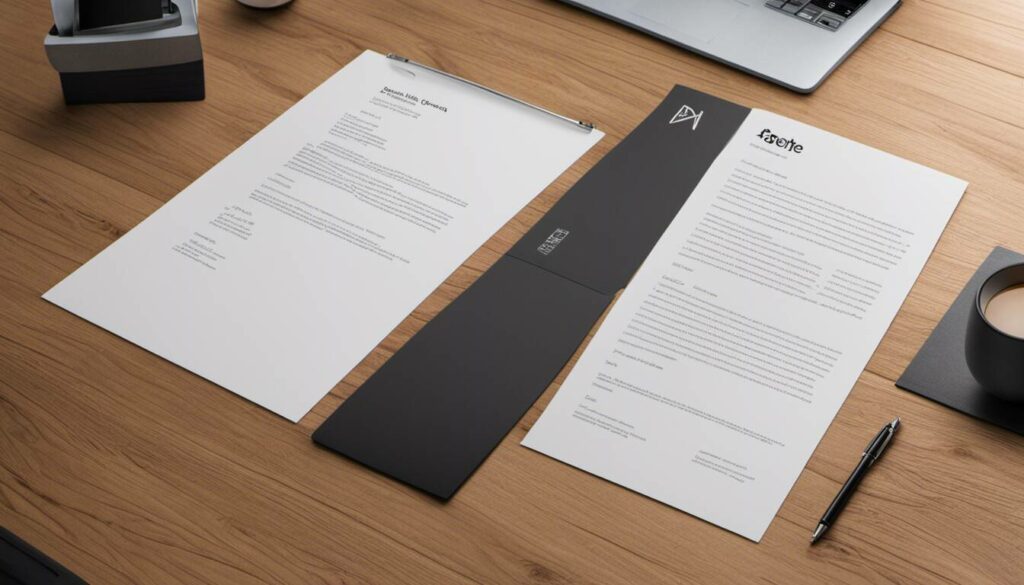
There are two main types of cover letters in the acting industry: submission notes and standard acting cover letters. Submission notes are short 2-3 sentence notes attached to online casting submissions, while standard acting cover letters are longer and usually sent via email or traditional mail.
Imagine you’re submitting your portfolio for a role in a Broadway production. In your submission note, you might briefly mention any connections you have to the show or director, express your enthusiasm for the material, and highlight any relevant experiences. A standard acting cover letter would provide more space to dive into your personal story, discuss your training and achievements, talk about why you are passionate about this particular production, and connect your experiences to the role being cast.
It’s important to tailor each cover letter to the specific recipient – whether it’s a casting director for a film, theatre company owner, or talent agent. This customization helps demonstrate your genuine interest in the project or representation while addressing their specific needs.
Crafting an acting cover letter is like preparing for a performance. Just as actors rehearse their lines and research their characters, writing a cover letter requires careful preparation and understanding of the role and the casting professional’s expectations. It’s about creating an authentic and compelling connection that leaves a lasting impression.
Cover Letter Examples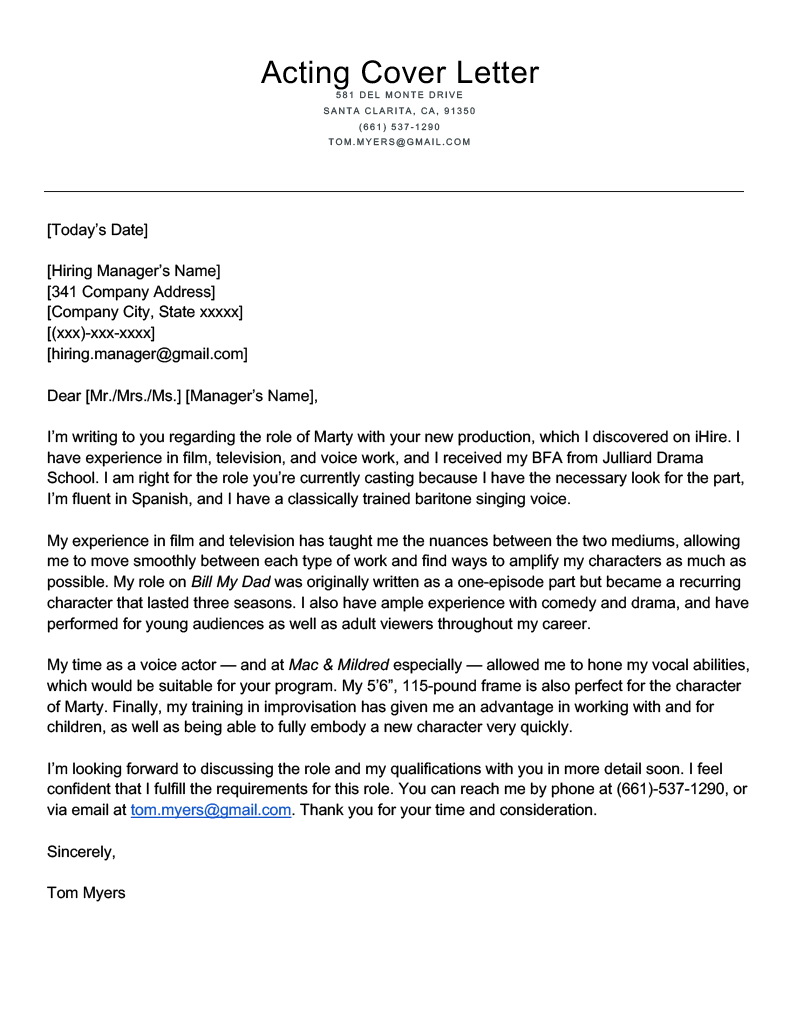
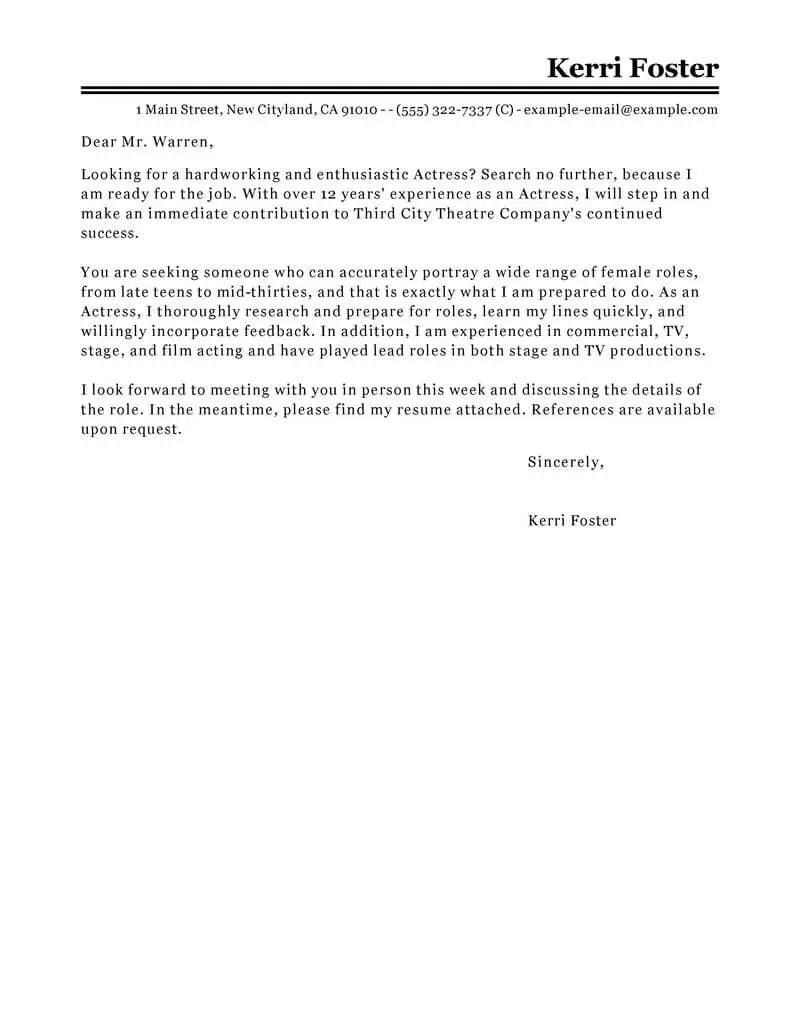
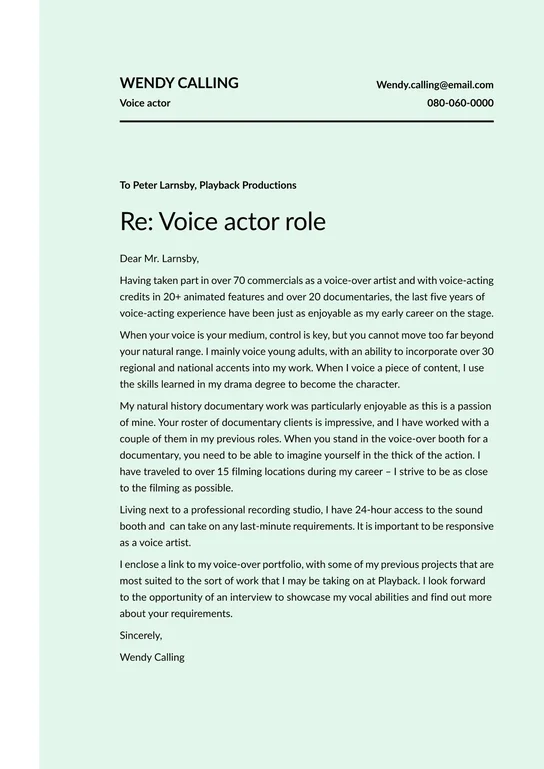 Voice Over Cover LetterCrafting Your Audition Cover Letter
Voice Over Cover LetterCrafting Your Audition Cover LetterCrafting an exceptional audition cover letter is key to catching the attention of casting directors and showcasing your suitability for a role. While it may seem daunting, breaking down the process into manageable steps can help you create a compelling cover letter that stands out from the competition.
First and foremost, start by researching the production or project you are applying for. Gain a deep understanding of the characters, storyline, and overall tone. This knowledge will enable you to tailor your cover letter to highlight why you are the perfect fit for the role.
Next, begin your cover letter with a strong opening paragraph that grabs the reader’s attention. Consider mentioning any mutual connections or previous work on similar projects. This personal touch will make your letter memorable and demonstrate your enthusiasm.
Throughout the body of your cover letter, focus on sharing specific experiences that align with the requirements of the role. Use anecdotes and examples to showcase your abilities and illustrate how you have successfully portrayed similar characters in the past. Highlight any training or skills that make you uniquely qualified for this particular project.
Highlighting Relevant Experience and SkillsWhen it comes to highlighting relevant experience and skills in your acting cover letter, specificity is key. Casting directors receive numerous submissions, so it’s crucial to concisely convey why you are the ideal candidate.
Instead of simply listing every credit and experience you’ve had, carefully select those that directly relate to the role you’re auditioning for. Targeting relevant experiences will show casting directors that you understand the requirements of the part and have successfully tackled similar challenges in previous projects.
For example, if you’re auditioning for a romantic lead in a theater production, mention past roles where you portrayed charismatic and romantic characters. Discuss how those experiences honed your ability to connect with audiences emotionally.
Don’t forget to emphasize any specialized skills or training that set you apart from other actors. If you possess skills like singing, dancing, or proficiency with dialects, be sure to highlight them in your cover letter. These additional skills can make you a valuable asset to the production and help you stand out among other actors.
Personalization in Cover LettersWhen it comes to writing an acting cover letter, personalization is key. Casting directors and agents receive countless cover letters, so you need to find ways to make yours stand out. One effective way to do this is by addressing the recipient by name. Take the time to research and find out who will be reading your letter, as this demonstrates professionalism and attention to detail. Additionally, personalize the content of your letter by referring to specific details about the production or role you are applying for. Show that you have done your homework and are genuinely interested in the opportunity.
For instance, if you’re applying for a role in a theatre production, mention the specific play and director’s name. This shows that you have taken the time to familiarize yourself with their work and are genuinely excited about the opportunity.
By personalizing your cover letter, you create a stronger connection with the reader and demonstrate your genuine interest in the role or production. It also highlights your professionalism and attention to detail—qualities that casting directors and agents appreciate when sifting through numerous submissions.
Now that we understand the importance of personalization in acting cover letters, let’s explore some strategies to make your letter stand out even further.
Making Your Letter Stand OutIn a sea of cover letters, it’s crucial to find ways to make yours memorable. Here are a few tips on how to make your acting cover letter stand out:
Tell a compelling story: Instead of simply listing your credits and experience, use storytelling techniques to captivate the reader’s attention. Share personal anecdotes that highlight your passion for acting or experiences that relate directly to the role you’re applying for.Name-drop mutual connections: If you have any connections within the industry or know someone who has worked with the production team before, mention them in your letter. This can help build credibility and establish a positive connection.Highlight relevant skills and qualifications: Focus on the skills and qualifications that make you a strong candidate for the role. Emphasize your training, special talents, or experiences that align with the character or production in question.Keep it concise and error-free: While it’s important to showcase your personality and enthusiasm, be mindful of the length of your letter. Keep it concise and free of any spelling or grammar mistakes. A polished and well-written cover letter demonstrates professionalism.Express gratitude: End your letter by expressing gratitude for the opportunity to be considered. Show appreciation for the casting director or agent’s time and consideration, as this leaves a positive final impression.Remember, each cover letter should be tailored to the specific role or production you’re applying for. Take the time to understand the requirements and expectations, and customize your letter accordingly.
Common Pitfalls and How to Avoid ThemWriting an acting cover letter can be a challenging task, full of potential pitfalls that can hinder your chances of standing out among the competition. So, what are some common pitfalls to avoid when crafting your acting cover letter? And how can you navigate around them to create a strong and impactful letter?
One common mistake is lacking personalization in your cover letter. Avoid sending generic letters that could apply to any casting opportunity. Instead, take the time to research the production, casting director, or agent you are submitting to. Tailor your cover letter to highlight why you specifically want to work on this project and why you believe you would be a great fit. Personalize your letter by mentioning specific elements from the production or expressing genuine enthusiasm for the role.
Spelling and grammar mistakes can also undermine your professionalism and credibility. Make sure to proofread your cover letter carefully before sending it out. Consider asking a trusted friend or family member to review it as well, as fresh eyes might catch errors that you might have overlooked. Remember, a polished and error-free cover letter reflects positively on your attention to detail and commitment to excellence.
Another pitfall is including an extensive list of credits and experiences without tying them directly to the role or production. While it’s important to showcase your past work and accomplishments, focus on highlighting relevant skills and experiences that make you a strong candidate for this particular role. Choose credits that demonstrate your ability to handle similar characters or productions.
For example, if you’re applying for a dramatic role in a theater production, emphasize any previous experience in serious or intense roles. Explain how these experiences have prepared you for the challenges of the current role and showcase your versatility as an actor.
Lastly, avoid using unclear language or being too vague in your cover letter. Clearly state which character or production you are submitting for. Share specific qualifications that make you suitable for the role. Provide clarity and detail, ensuring that the recipient understands exactly what you bring to the table.
By being mindful of these pitfalls, you can significantly enhance the effectiveness of your acting cover letter. Take the time to personalize your letter, proofread it thoroughly, focus on relevant experiences, and communicate with clarity. These small but important steps will help you create a cover letter that captures attention and increases your chances of securing the desired role.
Crafting a strong and impactful acting cover letter requires avoiding common pitfalls such as lack of personalization, spelling and grammar mistakes, irrelevant credits and experiences, and unclear language. Personalize the letter by mentioning specific elements from the production or expressing genuine enthusiasm for the role. Proofread it carefully to eliminate any errors and seek feedback from others. Emphasize relevant skills and experiences that make you a strong candidate. Clearly state which character or production you are submitting for and provide clarity and detail to help capture attention and increase your chances of securing the desired role.